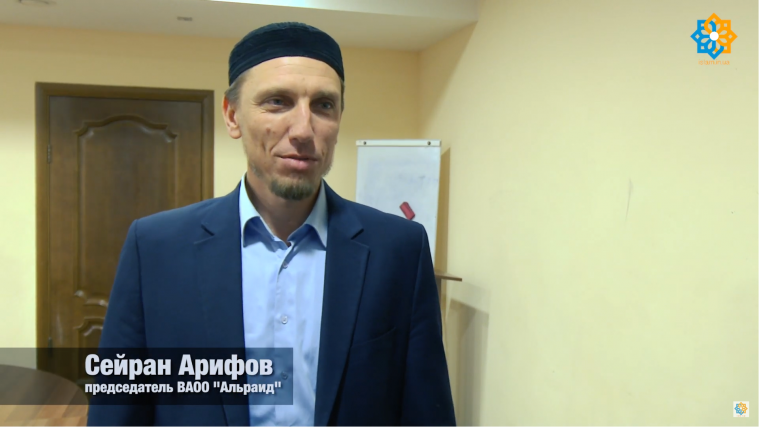Ansar Foundation public organisation has published a book “The Message on Muslims’ cohesion” by Sheikh Seyran Arifov, chairman of Alraid, the All-Ukrainian Association. The book highlights the hot topic of the inter-religious dialogue, as well as the problem of the Muslim community’s unity. A Muslim-oriented publication has already been sent to the mosques and Islamic Cultural Centers of “Ummah” Religious Administration of Muslims of Ukraine (RAMU Ummah).
Mykhailo Yakubobych, candidate of Historical Sciences, well-known Ukrainian religious scholar, orientalist, researcher of the Islamic doctrinal and philosophical thought, first translator of the Koran’s meanings into Ukrainian from the source language, editorial team member of The Minaret of Islam international Islamic magazine, Ukraine and Islamic World (Kyiv) magazine, Rocznik Tatarow Polskich (Poland) journal, member of the International Association for the Humanities (USA), the Islamic College of Advanced Studies (Norwich, UK), chairman of the Center for Islamic Studies at the Ostroh Academy National University, wrote a review on the Seyran Arifov’s work, published on the Religious Information Service of Ukraine (RISU) website under the heading: the Ukrainian Islamic Thinker’s reflections on Muslims’ cohesion.
Here is the full text of the review:
“The release of the new book by Sheikh Seyran Arifov, who now heads "Alraid" All-Ukrainian Association, is one of those pleasant surprises become more common in the Ukrainian Islamic environment. Traditionally, the Muslim segment of the Ukrainian book industries (it has been significantly raised in recent years, as evidenced by the regular Islamic organisations’ participation at the Book Arsenal, Lviv Book Forum and other events) is represented by translated or academic works, but the theological researches by modern Muslim intellectuals from Ukraine are published extremely rarely. In fact, in the modern history of Ukraine, this might be the first the theological Islamic book, written by the Ukrainian author of Crimean Tatar origin. That testifies also the revival of the glorious tradition of the past.
The Message, which was published in Russian language (despite different attitudes to this matter, and significant Ukrainization activities, the Islamic community in Ukraine is mostly Russian-speaking people) consists of three parts. The first part considers the problem of modern Islam disunion, the need to preserve cohesion, and, most importantly, find ways, which this unity can be achieved with. Relying on primary sources (the Koran, Hadiths), the author emphasizes that while dealing with differences, the most important and essential thing is following adab and Islamic ethics, in order to make discussion more fruitful. It is worth remembering that, for example, in Ottoman times, Muslim authors published hundreds of works, devoted to the adab discussion (adab al-bahs), among whom were people from the Crimea (for example, Mehmet Kefevi (died 1751)). Sheikh Seyran continues this line, referring to the heritage of the Islamic influencers of the Middle Ages, and telling many biographical, and even autobiographical stories, which makes a special spirit of the book.
The second part primarily concerns the mazhabs - the religious-legal schools of Islam, their values and differences in methods. The author constantly emphasizes that the concept of “knowledge” in Islam is associated with “practice”, and therefore, a person who wants good for society in general cannot cause hostility, hatred, or promote ideas that are far from moderate ones.
Finally, the third part reveals the most problematic topic that is differences in religious doctrine (Akida). And here Sheikh Seyran studies the Sunni tradition in three contexts - Asharit, Maturid and Asarit (Hanbali). He believes the problem of the present stays fanaticism in relation to one school and rejection of others, while the authors of the past tried to find a compromise position. It is worth remembering here, for example, attempts to combine Maturidism or Asharism, or, in some cases (as Abd al-Ghani an-Nabulusi (1641-1731) did, trying to adjust the Asharites and Hanbalites viewpoints. Sheikh Seyran precisely focuses on the common things, and not on the differences, which can be overcome by the conscious vision of both primary sources and of what exactly is the benefit for the Muslim community and society in general.
Despite citing hundreds of books, studied by the author, the work is surprisingly easy and accessible to read. It would be useful even for those, who just begin to study the Islamic tradition. I hope that in the near future both Ukrainian and English versions of this work will appear which is especially useful for Muslims living in a secularized world. ”
As we have informed, according to Sheikh Said Ismagilov, the Mufti of the Religious Administration of Muslims of Ukraine Ummah (RAMU Ummah), this work may also interest adherents of other religious, but requires the reader to have some background knowledge.
Reference: Seyran Arifov is a chairman of the "Alraid" All-Ukrainian Association. Since 1987 he had lived in the Crimea. After graduating from high school, he studied at a madrasa in Simferopol, then at the Lebanese University of Canan, the Islamic Studies specialty. He taught at the Khafiz School of the Religious Administration of the Crimean Muslims. He was the imam of the Islamic Cultural Centre mosque. He is the author of articles for "Alraid" newspaper, Islam.Plus and monographs on various Islamic topics.


